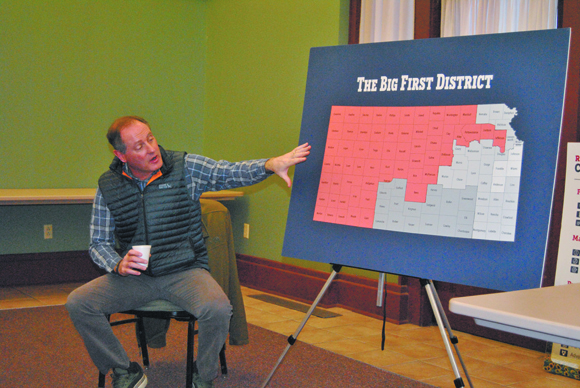ROBERT PIERCE
• Leader & Times
Last week, Kansas First District Congressman Tracey Mann visited several counties in Western Kansas, including Seward County, during his fourth annual Mann Listening Tour hearing from constituents about their concerns as the current Trump administration gets under way.
Thursday, Mann was at the Rock Island Depot in Liberal, and he started the local discussion with some of the changes that have been made to the Big First District.
“There are 435 congressional districts in the America, and ours is the 11th largest” he said. “It’s one of the biggest districts in the country. Redistricting happened a few years ago, and the heart of our district’s still the same. They’ve added Jackson County north of Topeka, Jefferson County. Our district starts in Elkhart and goes all the way over to Lawrence.”
Mann estimated the First District has 56 hospitals, most of which are critical access, both of which are more than any other congressional district in the country.
“Health care, access to health care, how we keep our rural hospitals going is something I work on a lot and care a lot about,” he said. “We’re also one of the top ag districts in the country. Our district produces more beef than any district in the country, more sorghum.”
With America set to celebrate its 250th anniversary of independence July 4, 2026, Mann said leaders need to look at what he sees as three major threats facing the country, the first of which is the national debt.
“We’re $36 trillion in debt,” he said. “In 2010, which was 15 years ago, we were at $13 trillion. We’ve added $23 trillion to the debt in the last 15 years. The speed of which we are spending money is not sustainable. Last year, 2024, was the first time in the history of this country the interest on the debt was the biggest line item in the federal budget.”
Likewise, Mann said 2024 was the first time in U.S. history more than $1 trillion dollars had been paid on interest on the debt, a number which exceeds spending for national defense.
“National defense, the second largest number, is about $860, $870 billion,” he said. “Last year, we $6.5 trillion, and $1 trillion of that was just for interest on the debt.”
The next threat, Mann said, comes from the country of China.
“If you just look at how they’re ramping up their military, what they’re trying to do in our country by buying farmland, other companies, intellectual property, they want to be the dominant country,” he said.
The third threat on Mann’s list is the nation’s border, and he said a large part of President Trump’s re-election campaign focused on securing the border.
“That was probably the biggest issue in Washington, and number two would be a return to common sense, specifically getting the bureaucracy under control,” he said. “It’s grown way beyond what I think the Founding Fathers intended.”
Mann said work on solving the border crisis made some progress right from the moment Trump took office in January with the passage of the Laken Riley Act.
“The Laken Riley Act basically says if you’re in the country illegally and you commit a crime of sexual assault, you would automatically be deported,” he said. “Every Republican voted for it in the House. I think 50, 60 Democrats voted for it. It passed overwhelmingly in the Senate as well. It was the first bill President Trump signed into law the day he was inaugurated.”
Agriculture is a top economic driver in the Sunflower State, and with the last Farm Bill passed in 2018 and extended twice beyond its expiration date in 2023, Mann said there is an urgent need to get a new bill in place.
“We’re in the current Farm Bill, and it expires Sept. 30,” he said. “I sit on the House Ag Committee. I’ve been very frustrated we’ve not gotten a five-year Farm Bill done.”
Mann said 81 percent of the Farm Bill focuses on nutrition, with other items taking up the remaining 19 percent, and he said amongst those items are crop insurance, conservation programs and other issues impacting production agriculture.
“I’m optimistic we’re going to get something done pretty quickly,” he said.
Mann too said getting more energy produced in America is key to making the country more prosperous.
“We have to consider how do we change the permitting process in this country so we can build power plants again?” he said. “If you want to go and build a power plant, you’re going to take 12, 15 years just going through the permitting process.”
Passed in 2017, the Trump tax cuts are set to expire Dec. 31, and Mann said if Congress does not act by Jan. 1, 2026, all Kansans will be looking at higher federal tax rates.
“That goes away at the end of this year,” he said. “Federal individual income tax rates go up. Estate tax rates go up. We need to make our current tax rates, I believe, permanent. There’s going to be a lot of discussion around taxes in Congress in the days, weeks and months ahead.”















